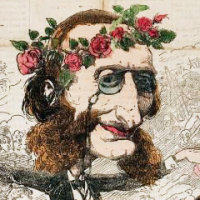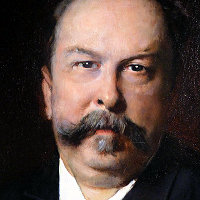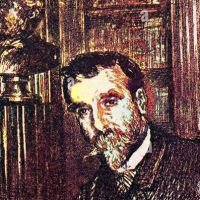2. Cancan/Cachucha.
My title today is largely a matter of alliteration. Orpheus in the Underworld, (1858) the first of the
two operettas by Jacques Offenbach we shall sample today, is indeed famous for its can-can. La Périchole
(1868), a largely fanciful bio-musical about a Peruvian street-singer, is also about a musician—but though it
contains a lot of Spanish-flavored dances, I doubt any of them is an actual cachucha.
Orpheus was the first of Offenbach's full-length operettas, after he made his name with dozens of
shorter ones. Périchole is a later example of the genre that established his position as the founder
of operetta and the man to be emulated, whether in Vienna by Strauss and Lehar, London by Gilbert and Sullivan,
or Broadway by Romberg and Friml. The obvious artifice of Offenbach's confections and the general flimsiness of
his plots have led directors to tackle him with an unusual range of styles covering the gamut of taste, which can
make it hard to find good videos to show. But nothing can obscure his obvious musical craftsmanship, rhythmic
verve, or ear for a good tune. rb.
The script, videos, and images will be posted immediately after class.
VIDEO LINKS
The situation for these two shows on YouTube is a bit iffy. At the time of writing, there are two good Orpheus
performances up there, including the one from Aix that we saw (though without titles) and another from Lyon (with
titles) featuring the real-life couple of Natalie Dessay and Laurent Naouri as Eurydice and Jupiter: superb
performances but in inferior video quality. But neither was there a few weeks ago, and they may well disappear
equally quickly. The Salzburg production is represented only by a trailer, an introduction by Barrie Kosky, and
a couple of clips which I did not show. The old BBC production shows its age, but as it is in English and has a
rather clever concept, it may be worth a look.
I have given a link where you can buy the Périchole DVD on Amazon for about $24. On YouTube, it is represented
only by a trailer and two clips: the pair of songs sung by Périchole and Piquillo in Act I and their duet in the
dungeon in Act III. But since those were both numbers I featured in class, they may well be enough as a reminder.
I also include the two trailers from other productions that I showed in class. *Asterisks mark items not shown.
rb.
| |
|
|
|
|
|
| IMAGES |
The thumbnails below cover the slides shown in class, though
there may be a few small discrepancies. Click the thumbnail to see a larger image.
Click on the right
or left of the larger picture to go forward or back, or outside it to close. |
 | |
 | |
 | |
 | |
 | |
 | |
 | |
 | |
 | |
Here are brief bios of the composers and writers considered in the class, listed in order of birth.
 |
Prosper Mérimée, 1803–70. French writer.
As a writer, Mérimée is probably best known for his 1845 novella Carmen, which became the basis of the 1875 Bizet opera. He also wrote the play on which Offenbach and his collaborators based La Périchole (1868). In public life, he served as superintentant of French monuments, supervising the restoration of Notre Dame and (with George Sand) discovering and preserving the celebrated Unicorn tapestries.
|
 |
Jacques Offenbach, 1819–80. German-French composer.
The son of a cantor, Offenbach took the name of the German town near Cologne in which he was born. After studying briefly at the Paris Conservatoire and establishing a career as cello soloist and conductor, he began to write operettas, composing over 90 in the course of a long and wildly successful career. He is also known for his unfinished grand opera The Tales of Hoffmann.
|
 |
Henri Meilhac, 1830–97. French playwright.
With Ludovic Halévy, he wrote the libretti for Bizet's Carmen and several Offenbach operettas including La belle Hélène and La Périchole. He was also the librettist of Massenet's Manon. In addition to his operatic libretti, he wrote more than 75 plays.
|
 |
Ludovic Halévy, 1834–1908. French playwright.
Halévy was one of the most celebrated librettists of his time, generally working in collaborations with other writers. He is best remembered for his work with Henri Meilhac, which includes Bizet's Carmen and La Périchole and many other operettas by Offenbach. The composer Fromental Halévy was his uncle.
|













